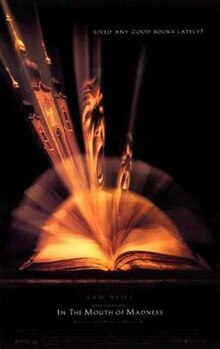John Carpenter's 'In the Mouth of Madness' and Reader-Writer Relationships
 I do realize that this is a movie and not a book and is not even based on a book, yet it is heavily influenced by the writing of P.H. Lovecraft and, in a very interesting way, deals with writing and books.
I do realize that this is a movie and not a book and is not even based on a book, yet it is heavily influenced by the writing of P.H. Lovecraft and, in a very interesting way, deals with writing and books.Hired to help locate a missing author, an insurance investigator discovers to his terror that the nightmarish events depicted in the writer's best-selling horror novels are coming true. Wishing to be both a horror film and a parody of the genre, John Carpenter's In the Mouth of Madness combines supernatural thrills with winking references. For instance, the vanished author, Sutter Cane (Jürgen Prochnow), is modeled on writers like Stephen King and Howard Phillips Lovecraft, from his great popularity to his obsession with small-town New England. Indeed, it is to one such hamlet that investigator John Trent (Sam Neill) and Cane's female editor (Julie Carmen) travel, discovering a town filled with terrifying scenes right out of Cane's books, from random axe murders to far worse. Have Cane's fans gone psychotic and begun imitating his writings, or are Cane's stories of an otherworldly evil invading the earth actually true?
Everyone who reads knows the experience of being sucked into a book and feeling as if it has changed you or given you a new outlook on life. But what would happen if enough people believed in a book to make it real? Just look at the Bible. These are stories written by humans, yet we believe in them so strongly that some of us believe they actually happened the way it is written down and order our lives in accordance to them. This is an example of the power an author has over his audience. If he is able to make us believe, he has our undivided attention and admiration. Look at how readers, including myself, worship J.R.R. Tolkien. He created a world, languages and species and we believe him while we read. Although we know reality is somewhere out there and we realize elves do not exist, Tolkien is able to command our mind in such a way that Middle earth and the Elves become viable to us.
What I found fascinating in the movie was how Carpenter played with the concept of the 'written story'. In one scene, Trent tries to drive away from Hobb's End, yet always magically returns to the centre of the town where a mob is waiting for him. To me, it seemed as if the story was constantly being rewritten by Crane and I loved this aspect. A character has only so much space to do as he pleases, but he will always have to fulfill his or her role in the author's plot. The author becomes almost God-like, who is not bound by what the reader might think is normal but gets to make all the rules himself. Take a look at the scene below:
The man on the right is Trent and the old man is Crane, the author. Here, his power is superbly shown.
What I started thinking about while watching the movie was the strange power-relationship between the reader and the author. On the one hand, the reader has ultimate control. They can completely reject an author's work, stripping him of his power. If we refuse to believe, the author has no ground to stand on. His creations become strange and unreal, nothing more than make-belief. Yet once the reader starts reading, he loses all control himself. The reader cannot influence how the story goes and just like the characters, we have to go along with the author and his ideas. His creations come alive for us, might scare or inspire us, influence us. The control of an author over our imagination is, I think, fascinating.
What do you think? Does an author have more control than the reader or the other way round?



Comments
Post a Comment